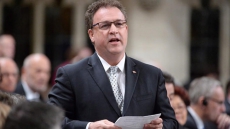OTTAWA — The Bank of Canada raised its benchmark interest rate Wednesday in an economy that it predicts will remain resilient even as it faces an even bigger bite from deepening trade tensions.
The rate hike was the central bank's first interest rate move in six months and lifted the trend-setting rate to 1.5 per cent, up from 1.25 per cent. It was the bank's fourth increase over the last 12 months and the first time the rate has been this high since December 2008.
The decision, a move that will likely prompt Canada's big banks to raise their prime rates, arrived in the middle of a trade dispute between Canada and the United States that's expected to hurt both economies.
Governor Stephen Poloz said trade tensions were the biggest issue on the table.
"In the projections we are presenting today, we have added more negative judgment to our business investment forecast in recognition of this," he said.
"We have also incorporated the effects of the U.S. tariffs on steel and aluminum, and the various countermeasures implemented around the world."
However Poloz said the bank cannot make policy on the basis of hypothetical scenarios.
"We felt it appropriate to set aside this risk and make policy on the basis of what has been announced," he said.
The bank raised the rate even as it predicts larger impacts from the widening trade uncertainty, particularly after the United States imposed steel and aluminum tariffs on Canada and Ottawa's retaliatory measures. The tariff fight, the bank estimated, will shave nearly 0.7 per cent from Canada's economic growth by the end of 2020.
However, the negative blow of the trade policies recently put in place are to be largely offset by the positives for Canada from higher oil prices, which are above US$73 per barrel, and the stronger U.S. economy, the bank said.
"Although there will be difficult adjustments for some industries and their workers, the effect of these measures on Canadian growth and inflation is expected to be modest," the bank said in a statement.
But in addition to steel and aluminum tariffs, Canada is facing a significant trade-related unknown that many believe would inflict far more damage on the economy: U.S. duties on the automotive sector.
U.S. tariffs on the auto sector's integrated cross-border supply chains would have "large impacts on investment and employment," the Bank of Canada warned Wednesday in its accompanying monetary policy report.
The bank, however, didn't quantify the possible effects of auto tariffs on Wednesday. Poloz has signalled in the past that he's focused on data he can measure rather than the impacts of trade policies that have yet to materialize.
Canadian businesses must also contend with the uncertainty surrounding the difficult renegotiation of the North American Free Trade Agreement, for which talks have stalled.
The Bank of Canada also has its eye on how widening global trade disputes, including an intensifying battle between the U.S. and China, will affect the world's economy. It warns that "escalating trade tensions pose considerable risks to the outlook" at the global level.
Even with the trade issues, the Bank of Canada is now predicting slightly stronger growth for Canada over the next couple of years, according to updated projections it released Wednesday in its quarterly monetary policy report.
It expects real gross domestic product to grow 2.2 per cent in 2019, up from its April call of 2.1 per cent, and by 1.9 per cent in 2020, compared with its previous prediction of 1.8 per cent. The economy's growth projection for this year remains at two per cent, the bank said.
Looking ahead, the bank predicts Canadian growth will continue to see bigger contributions from exports and business investment, which were both stronger than expected in the first three months of the year.
At the same time, household spending will represent a smaller and smaller share of overall growth due to the dampening effects of higher interest rates and stricter mortgage rules, it said.
Economists anticipate several more hikes this year and in 2019.
For its part, the bank said Wednesday that it's expecting higher interest rates will still be necessary over time to keep inflation near its target. However, it intends to continue with its gradual, data-dependent approach.
Leading up to the announcement, Poloz was widely expected to raise the interest rate following a run of encouraging economic numbers, including the Bank of Canada's own survey on business sentiment, still-solid job markets and growth in wages.
The bank, however, noted in its report that despite "healthy" labour market conditions, employment growth and average hours worked have slowed down compared to last year's surge. It also said underlying wage growth has been weaker than what would normally be expected in a tightened job market.
The country's inflation rate is expected to rise as high as 2.5 per cent — above the two per cent mid-point of the bank's target range — due to temporary factors such as higher gasoline prices. It's expected to settle back down to two per cent in the second half of 2019.
National Bank of Canada experts wrote in a note to clients Wednesday that when it comes to future hikes Poloz may choose to err on the side of caution because of the threats of auto tariffs, which they warned, if applied, would have "unambiguously devastating economic impacts," particularly in Ontario.
CIBC chief economist Avery Shenfeld wrote in a research note Wednesday that "there are worries ahead, growth hasn't been stellar, but the backdrop has been just good enough for the Bank of Canada to nudge rates a quarter point higher."




